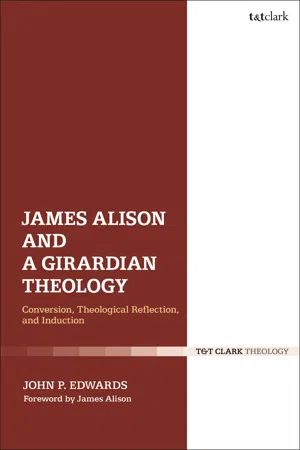
James Alison and a Girardian Theology
Conversion, Theological Reflection, and Induction
- 224 pages
- English
- PDF
- Available on iOS & Android
James Alison and a Girardian Theology
Conversion, Theological Reflection, and Induction
About This Book
Opening with a Foreword by James Alison, this volume is the first in-depth treatment of Alison's theological method. John P. Edwards shows that Alison's theological project outstrips René Girard's application of mimetic theory to theology. He concludes that an explicitly Christian theological perspective is necessary for providing a fully coherent account of Girard's notions of "conversion" and "mimetic desire". This volume grounds Alison's theological method in his understanding of the ongoing interaction between conversion and theological reflection, which is informed by his use of mimetic theory. While Alison describes this method as "theology in the order of the discovery", the author refers to it as an "inductive theology". The volume closes by demonstrating that such a theology bears fruit in a renewed understanding of the value of Christian doctrines and, particularly, the doctrine of revelation.
Frequently asked questions
Information


Table of contents
- Cover
- Contents
- Foreword by James Alison
- Acknowledgments
- Acknowledgment of Copyright Permissions
- 1 Introduction: James Alison’s Life and Theology
- Part One The Beginnings of a Christian Mimetic Anthropology
- 2.3 Things Hidden since the Foundation of the World (1978): Identifying the Contexts of the Modern Form of Desire
- 2.4 Girard’s Mature Thought: Mimetic Desire in a Gospel Perspective?
- Part Two An “Inductive” Theological Method and a Theological Anthropology Informed by Mimetic Theory
- 3.1 Alison’s Epistemology—An Overview
- 3.2 The Disciples’ Experience of Meeting the Risen Jesus as the Beginning of “Conversion”
- 3.3 From “Conversion” to Theological Reflection
- 4 From Theological Reflection to (Ongoing) Conversion: Sharing a Received Perspective through an Act of Witnessing
- 4.2 From Theological Reflection to Conversion through Witnessing
- 4.3 From Theological Reflection to Ongoing Conversion: An “Inductive” Theology
- 5 Theology “in the Order of Discovery” or an Inductive Theology
- 5.2 A Theological Anthropology Informed by Mimetic Theory
- 5.3 Contributions to Contemporary Christian Theological Questions
- 5.4 Conclusion
- Bibliography
- Index